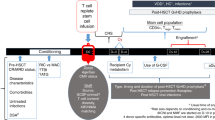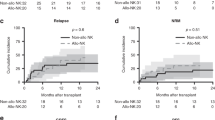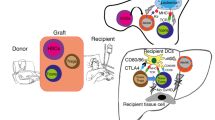Abstract
Clinical trials have shown that a strategy for haploidentical transplantation based on the infusion of high numbers of T-cell-depleted hematopoietic progenitor cells and no post-transplant immunosuppression controls graft rejection and GvHD in patients with acute leukemia. Overall, event-free survival compares favorably with reports of transplants using sources of stem cells other than the matched sibling. Current studies are focussing on rebuilding post-transplant immunity to improve clinical outcomes separating GvHD from favourable donor immune responses.
This is a preview of subscription content, access via your institution
Access options
Subscribe to this journal
Receive 12 print issues and online access
$259.00 per year
only $21.58 per issue
Buy this article
- Purchase on SpringerLink
- Instant access to full article PDF
Prices may be subject to local taxes which are calculated during checkout
Similar content being viewed by others
References
Reisner Y, Hagin D, Martelli FM . Haploidentical hematopoietic transplantation: current status and future perspectives. Blood 2011; 118: 6006–6017.
Aversa F, Martelli MF, Velardi A . Haploidentical hematopoietic stem cell transplantation with a megadose T-cell–depleted graft: harnessing natural and adaptive immunity. Sem Oncol 2012; 39: 643–652.
Aversa F, Tabilio A, Terenzi A, Velardi A, Falzetti F, Giannoni C et al. Successful engraftment of T-cell-depleted haploidentical ‘three-loci’ incompatible transplants in leukemia patients by addition of recombinant human granulocyte colony-stimulating factor-mobilized peripheral blood progenitor cells to bone marrow inoculum. Blood 1994; 84: 3948–3955.
Aversa F, Tabilio A, Velardi A, Cunningham I, Terenzi A, Falzetti F et al. Treatment of high risk acute leukemia with T-cell-depleted stem cells from related donors with one fully mismatched HLA haplotype. N Engl J Med 1998; 339: 1186–1193.
Aversa F, Terenzi A, Tabilio A, Falzetti F, Carotti A, Ballanti S et al. Full-haplotype mismatched hematopoietic stem cell transplantation: a phase II study in patients with acute leukemia at high risk or relapse. J Clin Oncol 2005; 23: 3447–3454.
Ruggeri L, Capanni M, Urbani E, Perruccio K, Shlomchik WD, Tosti A et al. Effectiveness of donor natural killer cell alloreactivity in mismatched hematopoietic transplants. Science 2002; 295: 2097–2100.
Moretta A, Locatelli F, Moretta L . Human NK cells: from HLA class I-specific killer Ig-like receptors to the therapy of acute leukemias. Immunol Rev 2008; 224: 58–69.
Ruggeri L, Mancusi A, Capanni M, Urbani E, Carotti A, Aloisi T et al. Donor natural killer cell allorecognition of missing self in haploidentical hematopoietic transplantation for acute myeloid leukemia: challenging its predictive value. Blood 2007; 110: 433–440.
Velardi A, Ruggeri L, Mancusi A, Aversa F, Christiansen FT . Natural killer cell allorecognition of missing self in allogeneic hematopoietic transplantation: a tool for immunotherapy of leukemia. Curr Opin Immunol 2009; 21: 525–530.
Ciceri F, Labopin M, Aversa F, Ljungman P, Verdonck LF, Volin L et alAcute Leukemia Working Party (ALWP) of European Blood and Marrow Transplant (EBMT) Group. A survey of fully haploidentical hematopoietic stem cell transplantation in adults with high-risk acute leukemia: a risk factor analysis of outcomes for patients in remission at transplantation. Blood 2008; 112: 3574–3581.
Bachar-Lustig E, Rachamim N, Li HW, Lan F, Reisner Y . Megadose of T cell-depleted bone marrow overcomes MHC barriers in sublethally irradiated mice. Nat Med 1995; 1: 1268–1273.
Gur H, Krauthgamer R, Bachar-Lustig E, Katchman H, Arbel-Goren R, Berrebi A et al. Immune regulatory activity of CD34+ progenitor cells: evidence for a deletion-based mechanism mediated by TNF-alpha. Blood 2005; 105: 2585–2593.
Bonini C, Ferrari G, Verzeletti S, Servida P, Zappone E, Ruggieri L et al. HSV-TK gene transfer into donor lymphocytes for control of allogeneic graft-versus-leukemia. Science 1997; 276: 1719–1724.
Ciceri F, Bonini C, Stanghellini MT, Bondanza A, Traversari C, Salomoni M et al. Infusion of suicide-gene-engineered donor lymphocytes after family haploidentical haemopoietic stem-cell transplantation for leukaemia (the TK007 trial): a non-randomised phase I-II study. Lancet Oncol 2009; 10: 489–500.
Perruccio K, Topini F, Tosti A, Carotti A, Burchielli E, Ruggeri L et al. Photodynamic purging of alloreactive T cells for adoptive immunotherapy after haploidentical stem cell transplantation. Blood Cells Mol Dis 2008; 40: 76–83.
Miyara M, Sakaguchi S . Human FoxP3(+) CD4(+) regulatory T cells: their knowns and unknowns. Immunol Cell Biol 2011; 89: 346–351.
Hoffmann P, Ermann J, Edinger M, Fathman CG, Strober S . Donor-type CD4(+)CD25(+) regulatory T cells suppress lethal acute graft-versus-host disease after allogeneic bone marrow transplantation. J Exp Med 2002; 196: 389–399.
Di Ianni M, Falzetti F, Carotti A, Terenzi A, Castellino F, Bonifacio E et al. Tregs prevent GVHD and promote immune reconstitution in HLA-haploidentical transplantation. Blood 2011; 117: 3921–3928.
Martelli MF, Di Ianni M, Ruggeri L, Pierini A, Falzetti F, Carotti A et al. ''Designed'' grafts for HLA-haploidentical stem cell transplantation. Blood 2014; 123: 967–973.
Handgretinger R, Lang P, Feuchtinger F et al. Transplantation of TcR αβ/CD19 depleted stem cells from haploidentical donors: robust engraftment and rapid immune reconstitution in children with high risk acute leukemia [abstract]. ASH Annual Meeting Abstracts 2011; 118 Abstract 1005.
Carding SR, Egan PJ . Gammadelta T cells: functional plasticity and heterogeneity. Nat Rev Immunol 2002; 2: 336–345.
Godder KT, Henslee-Downey PJ, Mehta J, Park BS, Chiang KY, Abhyankar S et al. Long term disease-free survival in acute leukemia patients recovering with increased gammadelta T cells after partially mismatched related donor bone marrow transplantation. Bone Marrow Transplant 2007; 39: 751–757.
Prezioso Lucia, Bonomini Sabrina, Lambertini Chiara et al. Haploidentical stem cell transplantation after negative depletion of t cells expressing the αβ chain of the T-cell receptor (TCR) for adults with hematological malignancies. Blood 2013; 122: 4609.
Author information
Authors and Affiliations
Corresponding author
Ethics declarations
Competing interests
FA has received consulting fees from Gilead, MSD, Pfizer, Genzyme, and received lecture fees from Gilead, MSD, Pfizer and Celgene.
Additional information
This article was published as part of a supplement, supported by WIS-CSP Foundation, in collaboration with Gilead, Milteny Biotec, Gamida cell, Adienne Pharma and Biotech, Medac hematology, Kiadis Pharma, Almog Diagnostic.
Rights and permissions
About this article
Cite this article
Aversa, F. T-cell depletion: from positive selection to negative depletion in adult patients. Bone Marrow Transplant 50 (Suppl 2), S11–S13 (2015). https://doi.org/10.1038/bmt.2015.88
Published:
Issue date:
DOI: https://doi.org/10.1038/bmt.2015.88



